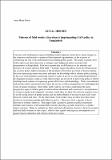| dc.description.abstract | Concerns with institutional capacity building in development tend to focus upon changes to the structures and incentive systems of development organisations, at the expense of considering the role of the individual in interpreting policy goals. This paper examines how field workers use their discretion to interpret and implement policy in rural credit
programmes in Bangladesh. It focuses in particular on differences in the attitudes and practices of women and men field staff. The paper argues that these lower-level bureaucrats are de-facto policy makers, because of the recursive effect of an accretion of local everyday decisions upon programme outcomes and upon the knowledge which informs policy making.
In the case of programmes promoting women's rights of access to non-traditional productive development resources such as credit, field workers are involved in delivering policies which challenge local systems of organising gender difference and disprivilege. Their own attitudes and practices have a powerful effect upon the success of these programmes in challenging the terms of gender relations. Most often, field workers' own biases undermine the more progressive aspects of these policies and reinforce dominant and conservative interpretations of women's needs in development. In other words, they use their discretion in negative ways, to avoid raising issues of gender justice and the redistribution of resources and social value
between women and men. On the other hand, field workers may use their discretion more positively, to promote gender-redistributive policy -- they may show a species of local heroism in women's interests. This paper finds a gendered pattern in policy enactment attitudes and routines, with women field workers showing a greater receptivity to gender equity concerns. There is certainly no black and white distinction, however, between women and men field workers in this respect, which warns against making easy assumptions as to gender-based solidarities and affinities between women. | en |

